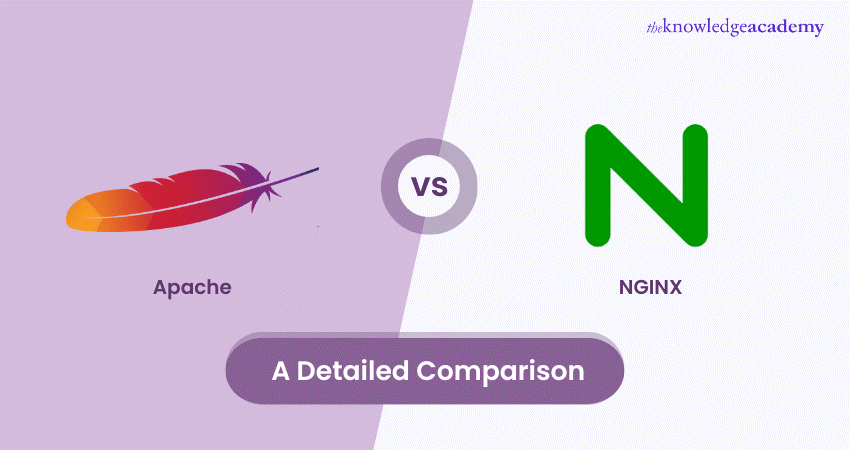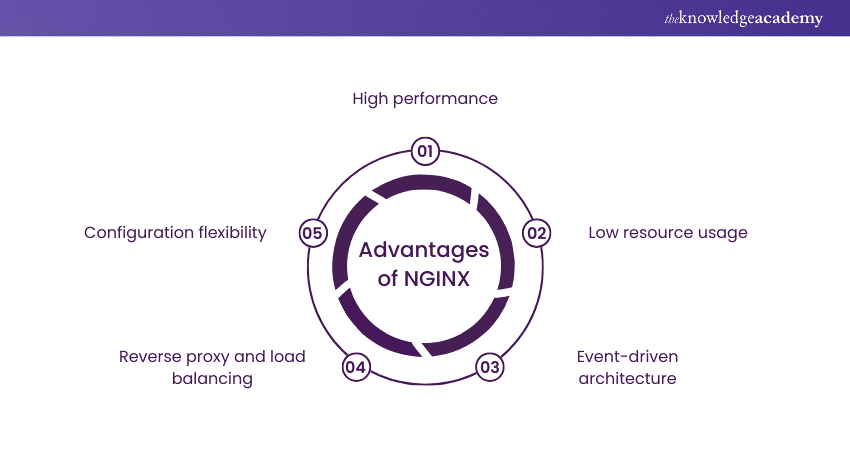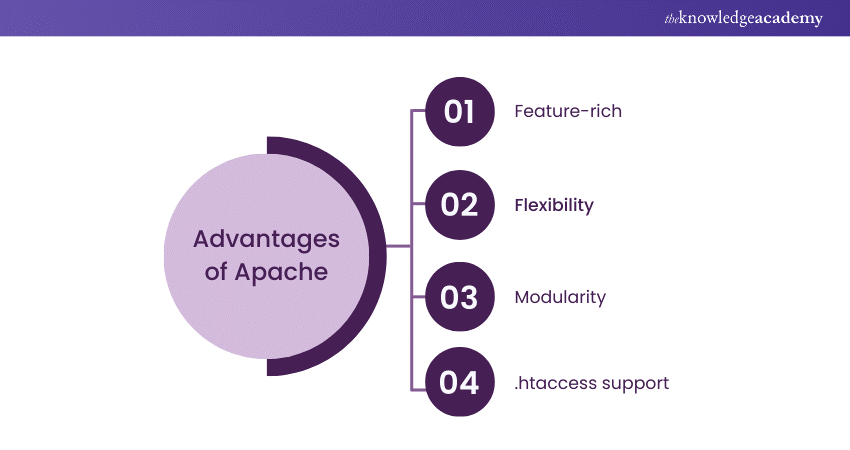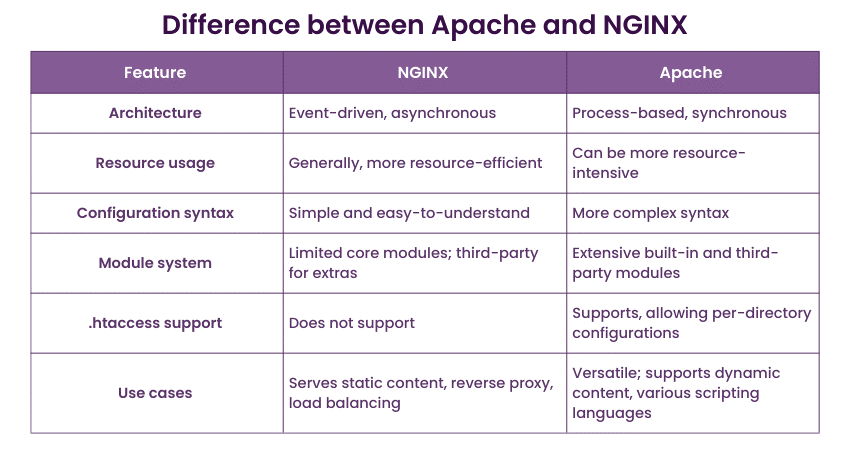We may not have the course you’re looking for. If you enquire or give us a call on 01344203999 and speak to our training experts, we may still be able to help with your training requirements.
We ensure quality, budget-alignment, and timely delivery by our expert instructors.

Apache and NGINX are among the most prominent web servers powering the Internet today. Tailored to handle diverse workloads and complement various software types, they contribute to the robustness of web application stacks.
However, when faced with deciding which web server to choose, it becomes apparent that while Apache and NGINX share similarities, they are different. Each follows its unique approach to configuration management, performance optimisation, and other aspects. Understanding these distinctions is paramount for making an informed choice between NGINX and Apache as a web hosting solution. Read further to learn more about the differences between Apache vs NGINX!
Table of Contents
1) What is NGINX?
a) Advantages of NGINX
2) What is Apache?
3) Difference between Apache and NGINX
4) Conclusion
What is NGINX?
NGINX is a popular open-source web server and reverse proxy server software. Originally developed to address the C10k problem (handling 10,000 simultaneous connections), NGINX has evolved into a versatile solution for serving static content, load balancing including features like Cloudflare Load Balancing, reverse proxying, and more. It is known for its high performance, scalability, and efficient resource utilisation. Preparing for technical roles involving NGINX often requires familiarity with common NGINX Interview Questions, covering topics from basic configuration to advanced troubleshooting.
Advantages of NGINX
The following are the advantages of NGINX:

1) High performance: NGINX is designed to handle many concurrent connections efficiently, making it well-suited for high-traffic websites.
2) Low resource usage: NGINX is lightweight and resource-efficient, making it an excellent choice for systems with limited resources.
3) Event-driven architecture: NGINX uses an event-driven, asynchronous architecture, allowing it to handle many connections with minimal resource usage.
4) Reverse proxy and load balancing: NGINX excels as a reverse Proxy Server and can distribute incoming traffic across multiple servers, improving performance and reliability.
5) Configuration flexibility: NGINX offers flexible syntax, making it easy to set up complex server configurations and customise settings.
Expand your learning curve by signing up for our IT Support and Solution Training now!
What is Apache?
Apache, or the Apache HTTP Server, is another widely used open-source web server software. Its popularity extends to various operating systems, including Windows, where users often seek information on how to Install Apache On Windows. It has a long history and is one of the most popular web servers. Apache supports various features, including the ability to serve static and dynamic content, support for different programming languages, and extensive customisation through modules. Exploring Apache Interview Questions can provide valuable insights and help enhance technical expertise.
Advantages of Apache
The following are the advantages of Apache:

1) Feature-rich: Apache is a feature-rich web server that supports a wide range of modules, enabling it to handle diverse tasks and serve various types of content.
2) Flexibility: Apache is highly configurable and supports a variety of modules, making it adaptable to different use cases and environments.
3) Modularity: The modular design of Apache allows administrators to turn on or off specific modules based on their requirements, optimising resource usage.
4) .htaccess support: Apache supports the use of .htaccess files, allowing users to override server configuration settings on a per-directory basis, providing flexibility and control.
Read and analyse data efficiently by signing up for our Snort Training now!
Difference between Apache and NGINX
The following are the differences between Apache vs NGINX:

Architecture:
1) NGINX: Event-driven, asynchronous architecture.
2) Apache: Process-based, synchronous architecture.
Resource usage:
1) NGINX: Generally, more resource-efficient, especially under high loads.
2) Apache: This can be more resource-intensive, particularly with many simultaneous connections.
Configuration syntax:
1) NGINX: Simple and easy-to-understand configuration syntax.
2) Apache: Uses a more complex configuration syntax compared to NGINX.
Start using Apache Spark with ease—download the Apache Spark Guide today!
Module system:
1) NGINX: Has a limited set of core modules; additional functionality often requires third-party modules.
2) Apache: Features various built-in and third-party modules, providing extensive functionality.
.htaccess support:
1) NGINX: Does not support .htaccess files, requiring server-level configuration changes.
2) Apache: Supports .htaccess files, allowing per-directory configuration overrides.
Use cases:
1) NGIX: NGINX is well-suited for serving static content, acting as a reverse proxy, and efficiently handling concurrent connections.
2) Apache: Historically popular for its versatility, supporting a wide range of features and use cases.
Master the art of data processing by signing up for our IT Fundamental Training now!
Conclusion
NGINX and Apache stand out as two highly popular web servers in contemporary usage. However, there are also several Nginx Alternatives worth considering, depending on the nature of your project and requirements. By understanding your specific needs, you can compare NGINX, Apache, and these alternatives to determine the most suitable choice. We hope you have understood the differences between Apache vs NGINX through our blog!
Create, deploy and manage your server by signing up for our Introduction to Networking Training now!
Upcoming IT Infrastructure & Networking Resources Batches & Dates
Date
 Apache Web Server Training
Apache Web Server Training
Fri 25th Apr 2025
Fri 20th Jun 2025
Fri 22nd Aug 2025
Fri 17th Oct 2025
Fri 19th Dec 2025






 Top Rated Course
Top Rated Course



 If you wish to make any changes to your course, please
If you wish to make any changes to your course, please


